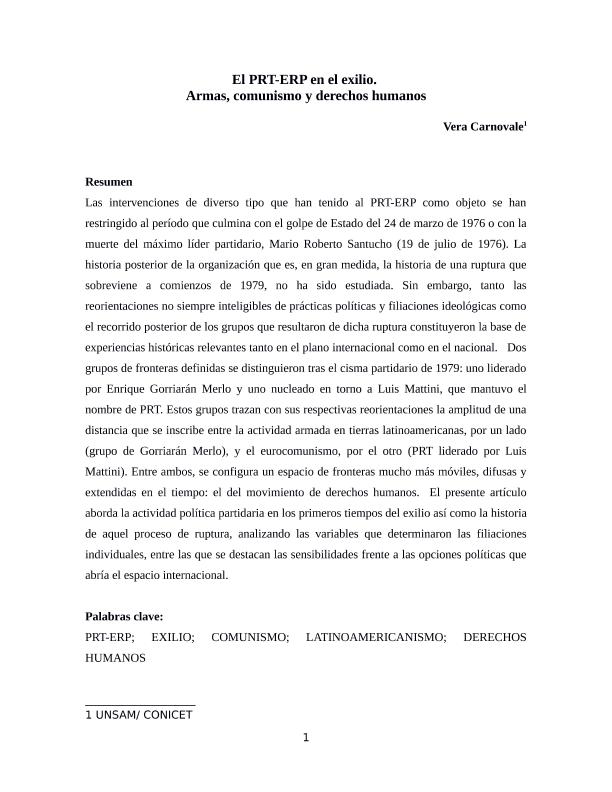Mostrar el registro sencillo del ítem
dc.contributor.author
Carnovale, Vera

dc.date.available
2018-05-17T17:00:26Z
dc.date.issued
2014-12
dc.identifier.citation
Carnovale, Vera; El PRT-ERP en el exilio: armas, comunismo y derechos humanos; Universidad Nacional del Comahue. Facultad de Humanidades; Revista de Historia; 15; 12-2014; 1-28
dc.identifier.issn
0327-4233
dc.identifier.uri
http://hdl.handle.net/11336/45469
dc.description.abstract
Las intervenciones de diverso tipo que han tenido al PRT-ERP como objeto se han restringido al período que culmina con el golpe de Estado del 24 de marzo de 1976 o con la muerte del máximo líder partidario, Mario Roberto Santucho (19 de julio de 1976). La historia posterior de la organización que es, en gran medida, la historia de una ruptura que sobreviene a comienzos de 1979, no ha sido estudiada. Sin embargo, tanto las reorientaciones no siempre inteligibles de prácticas políticas y filiaciones ideológicas como el recorrido posterior de los grupos que resultaron de dicha ruptura constituyeron la base de experiencias históricas relevantes tanto en el plano internacional como en el nacional. Dos grupos de fronteras definidas se distinguieron tras el cisma partidario de 1979: uno liderado por Enrique Gorriarán Merlo y uno nucleado en torno a Luis Mattini, que mantuvo el nombre de PRT. Estos grupos trazan con sus respectivas reorientaciones la amplitud de una distancia que se inscribe entre la actividad armada en tierras latinoamericanas, por un lado (grupo de Gorriarán Merlo), y el eurocomunismo, por el otro (PRT liderado por Luis Mattini). Entre ambos, se configura un espacio de fronteras mucho más móviles, difusas y extendidas en el tiempo: el del movimiento de derechos humanos. El presente artículo aborda la actividad política partidaria en los primeros tiempos del exilio así como la historia de aquel proceso de ruptura, analizando las variables que determinaron las filiaciones individuales, entre las que se destacan las sensibilidades frente a las opciones políticas que abría el espacio internacional.
dc.description.abstract
The research focused on the PRT-ERP have been restricted to the period leading up to the coup of March 24, 1976 or the death of the top party leader, Mario Roberto Santucho (July 19, 1976 ). The subsequent history of the organization -that is largely the story of a rupture occurs in early 1979- has not been studied. However, the not always intelligible reorientation of political practices and ideological affiliations, and the subsequent tour of the groups resulting from this break formed the basis of relevant both internationally and nationally historical experiences. Two groups were distinguished after the party schism of 1979: one led by Enrique Gorriarán Merlo and one nucleated around Luis Mattini, which kept the name of PRT. These groups plotted with their respective reorientations the amplitude of a distance that goes from the armed activity in Latin American lands, on one hand (group Gorriarán Merlo), and eurocomunismo, on the other (PRT led by Luis Mattini). Between them, a space of boundaries much more mobile, diffuse and extended (in time and space) is configured: the human rights movement This article deals with party politics in the early days of exile and the story of the rupture process, analyzing the variables that determined the individual affiliations, among which highlights the sensitivities to the political options opened by the international space.
dc.format
application/pdf
dc.language.iso
spa
dc.publisher
Universidad Nacional del Comahue. Facultad de Humanidades
dc.rights
info:eu-repo/semantics/openAccess
dc.rights.uri
https://creativecommons.org/licenses/by-nc-sa/2.5/ar/
dc.subject
Prt-Erp
dc.subject
Derechos Humanos
dc.subject
Comunismo
dc.subject
Sandinismo
dc.subject.classification
Historia

dc.subject.classification
Historia y Arqueología

dc.subject.classification
HUMANIDADES

dc.title
El PRT-ERP en el exilio: armas, comunismo y derechos humanos
dc.type
info:eu-repo/semantics/article
dc.type
info:ar-repo/semantics/artículo
dc.type
info:eu-repo/semantics/publishedVersion
dc.date.updated
2018-05-17T14:16:22Z
dc.journal.number
15
dc.journal.pagination
1-28
dc.journal.pais
Argentina

dc.journal.ciudad
Neuquén
dc.description.fil
Fil: Carnovale, Vera. Universidad Nacional de San Martín; Argentina. Consejo Nacional de Investigaciones Científicas y Técnicas; Argentina
dc.journal.title
Revista de Historia
dc.relation.alternativeid
info:eu-repo/semantics/altIdentifier/url/http://revele.uncoma.edu.ar/htdoc/revele/index.php/historia/article/view/868
Archivos asociados
